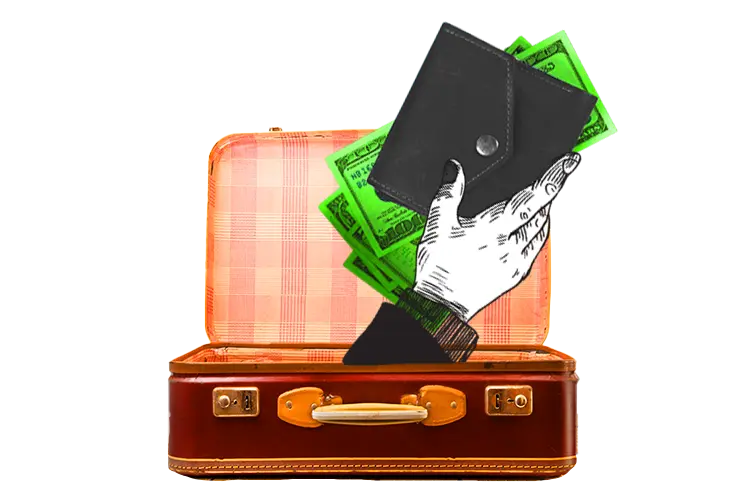
An 18th-century castle, a white sand beach, a mountaintop! The options are endless when you’re planning a destination wedding. However, while it’s fun to daydream a little when you’re asking guests to travel hundreds, if not thousands, of miles to celebrate your nuptials, it’s important to be considerate. To that end, we’ve put together a guide to help you navigate destination wedding etiquette. Our guide will give you a better understanding of when to send out invitations, how to keep your guests updated, and who pays for what.
So, dust off your passport and pack your bags — We’re embarking on a journey into the wide world of destination wedding dos and don’ts.
The first step to understanding good destination wedding etiquette is to compare it to local wedding etiquette. Here’s a brief overview of best practices for each type of wedding.
| Wedding Considerations | Local Wedding Best Practices | Destination Wedding Best Practices |
| What’s the size of the guest list? | However many people you’re comfortable inviting. | 50 people is a reasonable maximum. |
| When do you send save the dates? | About four months ahead of the wedding. | Six to nine months ahead of the wedding. |
| When do you send invitations? | About two months before the wedding. | About three months before the wedding. |
| What do you include in the invitation? | The date, time, and location of the ceremony, plus information on how and when to RSVP. | A full itinerary for all planned events, as well as lodging information. |
| Do we need wedding favors? | It’s a nice gesture but not required. | It’s a good idea to provide guests with a welcome gift. |
If we could say just two things about good destination wedding etiquette, they would be, (1) plan ahead and (2) provide as much information as possible. We’ll go into more detail, but if you keep these two principles in mind, you’re already off to a great start.

When you’re asking guests to travel long distances to get to your wedding, give plenty of advance notice. Send save the dates at least six months ahead of your wedding day, then follow up with formal invitations at least three months ahead of time. Giving this amount of lead time allows guests to research flight deals, reserve accommodations, and renew their passports (if necessary).
If you want to go the extra mile for your guests, consider hiring a travel agent. This person can organize flights, coordinate layovers, and handle cancellations. Even better? They might even be able to score some group discounts.
Whether or not you hire a travel agent, it’s important to give your guests as much information as possible ahead of time. You can provide some details on the save the dates, but a detailed wedding website is the best place to highlight need-to-know information. Provide information like…
It’s also wise to offer contact information in case guests have questions or concerns. This contact could be the wedding planner, the maid of honor, or you and your partner.

Given how far guests have to travel to attend a destination wedding, it’s normal to arrange an extended celebration lasting three to five days.
Give your guests a warm welcome to your wedding celebration by offering a gift when they arrive. It may seem like a small gesture, but a gift bag filled with a few bottles of water, some local snacks, and a coupon to a local restaurant goes a long way.
Besides the gift bag, we recommend hosting a welcome dinner once everyone arrives. Although it serves a similar function to the rehearsal dinner, a welcome dinner or party isn’t exactly the same thing. Whereas the rehearsal dinner is a chance to spend time with the wedding party and close family, the welcome event is open to all guests.
Following the welcome party, organize some local activities for the next few days. Activities will depend on the location, your budget, and your preferences; however, local cooking classes, nature walks, and chartered boat rides are guaranteed crowd-pleasers.
While it’s important to provide some entertainment for your guests, downtime is equally valuable. We recommend scheduling just one or two events per day. Leave the rest of the schedule open so guests can explore and relax independently.
As strange as it sounds, the actual wedding day might be the least stressful day of the whole multi-day event.
The only thing you absolutely need to do is provide transportation for your guests to get to and from the wedding ceremony. Aside from that, focus on looking your best, connecting with your partner, and having fun at the wedding reception.

After you’ve danced the night away, send your guests off with a farewell brunch. This is a great opportunity to thank your guests and ensure they get to their next destination safely. Beyond that, it’s an excellent way to signal the end of the festivities so the bride and groom can enjoy some alone time.
If you feel up to it, you can also host an informal reception several weeks after the destination wedding for invitees who couldn’t make it once you get home. It doesn’t have to be anything big; a cocktail party or a barbecue is enough to make friends and family feel included in your nuptials.

Since destination weddings are a relatively new practice, there aren’t any hard and fast rules about who pays for what. Still, there are some general guidelines to keep in mind to avoid poor destination wedding etiquette.
The engaged couple pays for…
Guests pay for…
The wedding party pays for their own…
There are some other elements of the destination wedding that you may want to consider paying for your guests as a show of appreciation, but it’s not strictly necessary. These elements include…
Regardless of the destination, attending a destination wedding can be pricey. From upfront costs like airfare and accommodations to on-the-ground expenses like dining and entertainment, the costs add up quickly. If your financial situation doesn’t allow you to attend, there’s no shame in declining the invitation.
It’s impossible to predict how your friends and family will RSVP to a destination wedding. Still, it’s safe to say that at least 15% of those invited will decline. Depending on the destination, the season, and the costs associated with attending, the percentage of those who decline could reach as high as 30%.
It depends on the couple. Some couples understand that guests pay a lot to attend a destination wedding, so they don’t ask for wedding gifts. Others register as normal, providing gift options at various price points. Pay attention to the wedding website for more information about what’s expected.
Set on a destination wedding? Now, choose a location, find the right date, and organize the itinerary. For help with these tasks and more, check out our comprehensive guide to destination wedding planning.